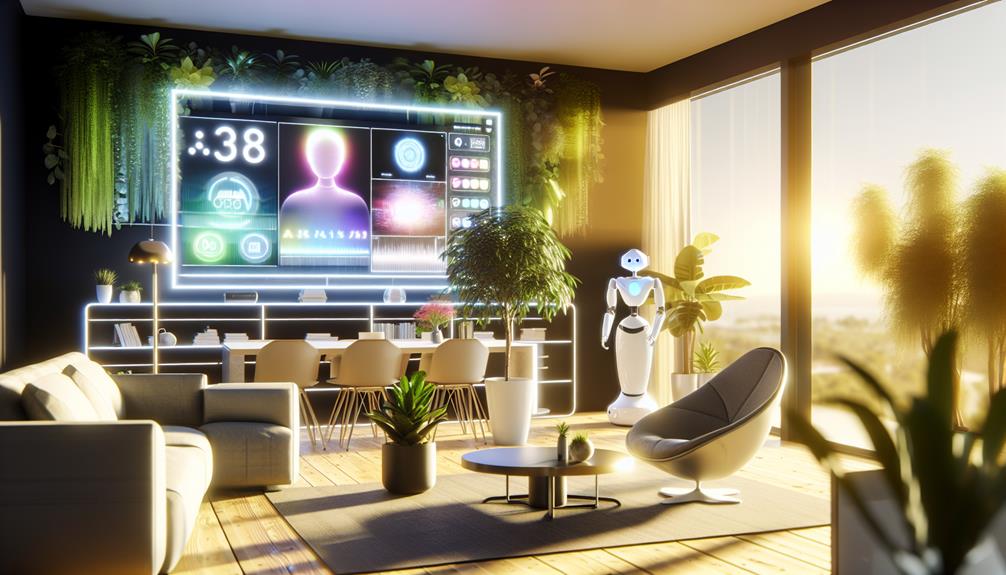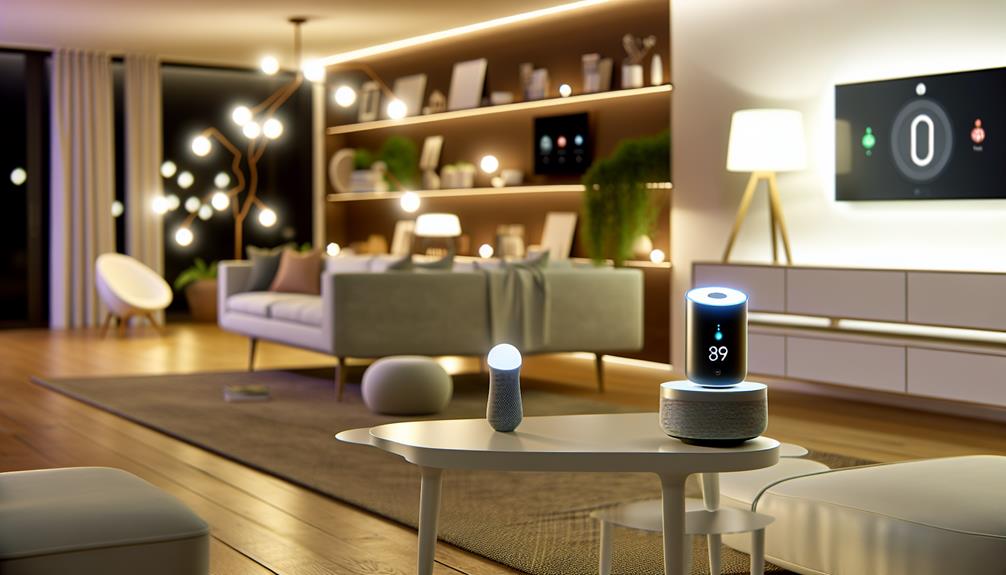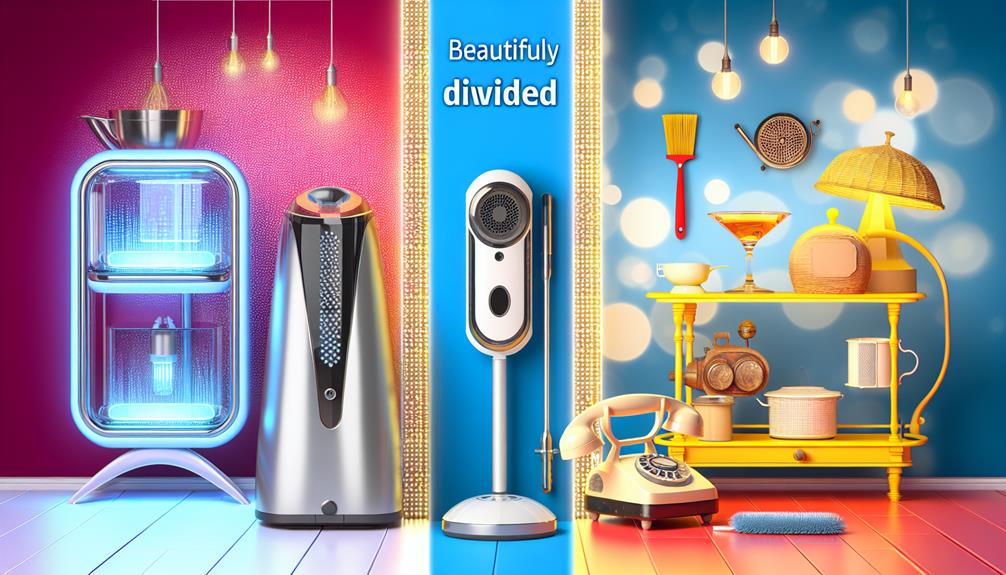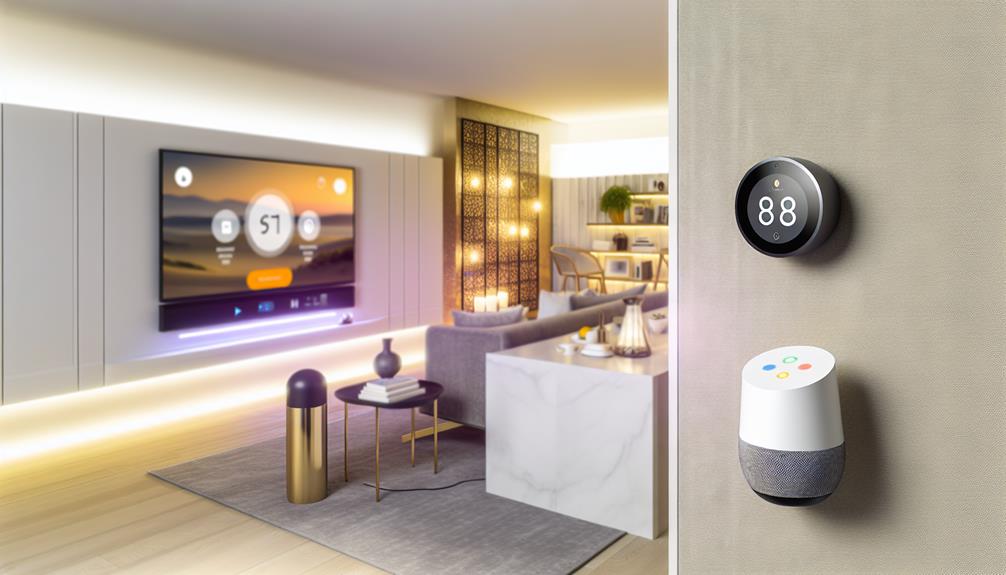80% of Homes Will Embrace AI Smart Tech
The projected adoption of AI smart technology in 80% of homes by the end of the decade signals a significant transformation in residential living. This shift promises to enhance energy efficiency, bolster home security, and streamline daily tasks, ultimately reshaping the way individuals interact with their living spaces. As these intelligent systems learn user preferences, they offer a level of personalization previously unattainable. Yet, the implications of such widespread integration extend beyond mere convenience. What challenges and opportunities might arise as we navigate this evolving landscape?
Key takeaways
- Increasing integration of smart technology in households is projected to reach 80%, driven by advancements in AI and user demand for convenience.
- AI smart tech enhances energy efficiency, leading to cost savings and sustainability, making it an attractive option for homeowners.
- Improved home security features offered by smart systems contribute to their growing popularity, ensuring safety for residents and property.
- The convenience and comfort provided by AI technologies streamline household management, appealing to a broader audience of homeowners.
- Future predictions indicate that smart homes will prioritize intuitive user experiences and sustainability, further encouraging widespread adoption of AI technologies.
Rise of AI in Homes
The rise of artificial intelligence (AI) in homes has marked a significant shift in how individuals interact with their living spaces, with an estimated 70% of households in developed countries now integrating some form of smart technology.
AI assistants, equipped with advanced voice recognition capabilities, facilitate seamless communication between users and smart appliances, enhancing daily routines.
Machine learning algorithms power predictive analytics, allowing these systems to learn user preferences and behaviors over time. This creates personalized experiences that make home automation more intuitive and responsive to individual needs.
For instance, smart thermostats can adjust temperatures based on past behaviors, while security systems can utilize remote monitoring to guarantee user safety.
However, the increasing reliance on AI in domestic settings raises critical concerns about user privacy and data security.
As homes become more interconnected, the potential for data breaches and unauthorized access to personal information grows.
Consequently, it is vital for users to remain vigilant about the implications of integrating AI technology into their lives.
Balancing innovative convenience with privacy protection will shape the future of AI in homes, fostering a sense of belonging in an increasingly digital environment.
Key Benefits of Smart Tech
The integration of smart technology in homes brings significant advantages that enhance daily living.
Key benefits include improved energy efficiency, which translates to cost savings and sustainability, as well as enhanced home security features that protect residents and their property.
In addition, the convenience and comfort offered by smart devices streamline household management, ultimately enriching the overall living experience.
Enhanced Energy Efficiency
Harnessing advanced smart technology in homes greatly enhances energy efficiency, transforming the way households consume and manage energy resources. By integrating smart devices such as smart thermostats and automated lighting systems, homeowners can considerably reduce their energy consumption while promoting sustainable living.
These technologies provide real-time energy monitoring and consumption tracking, allowing families to identify patterns and make informed decisions about their energy use.
Key benefits of enhanced energy efficiency include:
- Smart Appliances: Devices that optimize energy usage based on your lifestyle and preferences.
- Renewable Sources Integration: Facilitating the use of solar panels or wind turbines to power your home sustainably.
- Eco-Friendly Upgrades: Implementing energy-efficient solutions that not only save costs but also contribute to environmental preservation.
These innovations encourage eco-conscious living, making it easier for families to adopt more responsible practices.
As homes become increasingly interconnected, the potential for energy savings and sustainability is immense. With smart technology, individuals are empowered to create a harmonious balance between comfort and ecological responsibility, ensuring a greener future for all.
Improved Home Security
In today's world, the integration of smart technology in home security systems offers unprecedented levels of protection and peace of mind for homeowners. Smart surveillance systems utilize advanced AI algorithms to provide real-time threat detection, ensuring that potential intrusions are identified swiftly and accurately.
These systems can be combined with biometric access controls, allowing only authorized individuals to enter a home, which greatly enhances security.
Remote monitoring capabilities enable homeowners to keep an eye on their property from anywhere, providing reassurance while traveling or at work. In the event of suspicious activity, these systems deliver emergency alerts directly to the homeowner's smartphone, facilitating immediate action if necessary.
However, with these advancements come privacy concerns that warrant careful consideration; data encryption plays a significant role in safeguarding personal information against unauthorized access.
As smart technology continues to evolve, it fosters a deeper sense of community among homeowners who prioritize safety and security. By embracing these innovations, individuals not only protect their homes but also contribute to a broader culture of vigilance and mutual care, enhancing overall neighborhood security.
Ultimately, improved home security through smart tech is not just about protection; it's about cultivating a sense of belonging.
Increased Convenience and Comfort
Smart technology frequently transforms the way homeowners experience daily living, enhancing convenience and comfort through seamless automation and integration. The advent of smart assistants and voice control systems allows users to manage their environments effortlessly, creating personalized settings that cater to individual preferences.
With intuitive interfaces, homeowners can easily navigate and customize their smart devices, guaranteeing an ideal living experience.
Key benefits of smart tech include:
- Remote Access: Control home systems from anywhere, enhancing flexibility and peace of mind.
- Automated Routines: Simplify daily tasks through automation, allowing for smoother shifts between activities.
- Health Monitoring: Track wellness metrics and receive alerts, promoting a healthier lifestyle.
Moreover, predictive maintenance capabilities guarantee that home systems function effectively, reducing the likelihood of unexpected breakdowns.
This lifestyle enhancement fosters a sense of belonging, as families can create environments tailored to their needs. Ultimately, the integration of smart technology not only elevates comfort but also cultivates a home that adapts to its inhabitants, creating a harmonious living space that resonates with the essence of modern life.
Innovative AI Devices
Revolutionizing the way we live, innovative AI devices are increasingly becoming integral components of modern households. These technologies, including voice assistants and smart appliances, provide unparalleled convenience and efficiency. Voice assistants, for instance, facilitate hands-free control over various devices, enabling seamless interaction and enhancing daily routines.
Moreover, the integration of predictive maintenance features in smart appliances helps in anticipating potential issues before they escalate, ensuring that homes remain functional and efficient. Enhanced remote monitoring capabilities allow homeowners to oversee their properties from afar, fostering a sense of security and control.
AI devices also excel in delivering personalized experiences through adaptive learning, tailoring their responses and functionalities to individual preferences. Health tracking features in wearables and smart home systems provide insights into well-being, promoting a healthier lifestyle. Automated lighting solutions not only enhance ambiance but also contribute to energy conservation.
However, as these devices harness data analytics to improve user experiences, concerns regarding user privacy must be addressed. Striking a balance between technological advancements and ethical considerations will be essential as we further embrace innovative AI devices in our homes.
This evolution offers possibilities for belonging, comfort, and enhanced living environments.
Integration With Home Systems
Increasingly, homeowners are discovering the advantages of integrating AI technologies with existing home systems, creating a cohesive and efficient living environment. This integration enhances the functionality of traditional systems, allowing for smarter home ecosystems that adapt to the unique needs of each household.
By adhering to AI compatibility standards, homeowners can guarantee seamless communication between devices, leading to improved energy management, convenience, and overall comfort.
The benefits of this integration include:
- Enhanced Automation: AI can learn user preferences and automate tasks such as lighting, heating, and appliance usage.
- Interconnectivity: Devices work together harmoniously, providing a unified control interface that simplifies user interaction.
- Energy Efficiency: Smart systems can analyze usage patterns to optimize energy consumption, reducing costs and environmental impact.
As homeowners embrace this technological shift, they not only enhance their living spaces but also foster a sense of belonging within a community that prioritizes innovation.
The future of home living is not just about smart devices; it's about creating a connected, intelligent environment that responds to our needs and enriches our daily lives.
Security Enhancements
Home security has transformed considerably with the advent of AI technologies, offering homeowners unprecedented levels of protection and peace of mind. The integration of biometric authentication guarantees that only authorized individuals access your home, greatly reducing the risk of unauthorized entry.
Additionally, advanced surveillance technologies enable remote monitoring, allowing homeowners to keep an eye on their properties from anywhere, fostering a sense of community and shared safety.
AI-enhanced threat detection systems analyze real-time data to identify potential security breaches, alerting homeowners before a situation escalates. However, these advancements bring privacy concerns, necessitating robust data encryption methods to safeguard personal information.
As homeowners increasingly rely on these technologies, the significance of addressing system vulnerabilities cannot be overstated.
User customization plays a fundamental role in maximizing security, as individuals can tailor their systems to suit their specific needs and preferences. By empowering homeowners through intuitive interfaces and adaptable features, AI-driven security solutions foster a sense of belonging and ownership.
As we embrace these innovations, it is essential to strike a balance between enhanced security and the protection of personal privacy, providing a safe haven for all.
Energy Efficiency Improvements
The integration of AI technologies in residential settings extends beyond security enhancements, greatly impacting energy efficiency as well. Homeowners increasingly seek sustainable living solutions, and AI-driven innovations are at the forefront of this movement.
With smart appliances and eco-friendly systems, households can optimize energy management and reduce their overall energy consumption.
Prominent advancements include:
- Smart thermostats that learn user preferences and adjust heating and cooling patterns automatically, enhancing home insulation.
- Automated monitoring systems that track energy usage in real-time, allowing residents to make informed decisions about their energy consumption.
- Efficient lighting solutions that adjust based on occupancy and natural light availability, greatly lowering energy bills.
Future Predictions for Smart Homes
As the landscape of smart homes continues to evolve, enhanced energy efficiency and seamless home automation are poised to become central features.
Future advancements are likely to integrate AI technologies that not only optimize energy consumption but also facilitate a more intuitive user experience.
These developments will redefine how homeowners interact with their living spaces, ultimately leading to smarter and more sustainable home environments.
Enhanced Energy Efficiency
Smart home technology is poised to revolutionize energy consumption, promising significant advancements in efficiency that will redefine residential living.
As homeowners increasingly seek sustainable architecture, the integration of smart appliances becomes essential in reducing energy waste. These innovations not only enhance convenience but also contribute to a collective effort towards environmental stewardship.
The potential of smart technology in enhancing energy efficiency can be illustrated through the following key features:
- Real-time monitoring: Homeowners can track energy usage patterns, allowing them to make informed decisions about their consumption.
- Adaptive systems: Smart appliances can adjust their operation based on user habits and energy pricing, optimizing performance while minimizing costs.
- Enhanced insulation: Smart thermostats and smart windows can automatically regulate temperature, ensuring comfortable living spaces while conserving energy.
As we embrace these advancements, the sense of belonging to a community committed to sustainable practices grows stronger.
By adopting smart home technologies, homeowners not only improve their living conditions but also play a critical role in fostering a more sustainable future for all.
The shift towards enhanced energy efficiency is not just a trend but a necessary evolution in how we inhabit our homes.
Seamless Home Automation
Imagine walking into a home where every device seamlessly communicates and collaborates to enhance your daily life. This vision of seamless home automation is rapidly becoming a reality through the evolution of smart home ecosystems.
These interconnected systems allow for intelligent management of various household functions, from lighting and heating to security and entertainment, all tailored to individual preferences.
Central to this innovation is user interface design, which plays a pivotal role in ensuring that homeowners can interact intuitively with their devices. A well-designed interface fosters a sense of belonging, enabling users to customize their environments effortlessly.
The integration of AI further enhances this experience, allowing systems to learn from user behaviors and adapt accordingly.
As smart home ecosystems evolve, they will not only prioritize convenience but also promote sustainability and energy efficiency. Future homes will harness data to optimize resource usage, contributing to a more sustainable lifestyle.
Ultimately, seamless home automation will redefine our interactions with technology, creating warm, responsive living spaces that cater to our daily needs while fostering a profound connection to our environment.
Frequently Asked Questions
What Is the Cost of Converting My Home to Smart Tech?
Converting your home to smart technology involves budget considerations that vary widely. Initial costs may be significant, but analyzing long-term savings on energy and maintenance can justify the investment, enhancing both comfort and efficiency in your living space.
How Do I Choose the Right Smart Devices for My Home?
Choosing the right smart devices involves evaluating device compatibility with existing systems and aligning options with user preferences. Prioritize features that enhance convenience and security, ensuring a seamless integration that enriches your living environment and lifestyle.
Can I Install Smart Tech Without Professional Help?
Installing smart technology independently is feasible through DIY installation, provided you guarantee tech compatibility among devices. Thorough research and adherence to guidelines can facilitate successful integration, empowering you to create a cohesive smart home environment.
How Will AI Smart Tech Affect My Home Insurance?
AI smart technology can enhance risk assessment for home insurance, potentially leading to policy discounts. By accurately monitoring security and environmental factors, these innovations help insurers better evaluate risk profiles, benefiting homeowners through lower premiums and improved coverage options.
What Are the Environmental Impacts of AI Smart Tech?
Artificial intelligence symbolizes a new dawn for environmental sustainability. By enhancing energy efficiency, reducing carbon footprints, promoting waste reduction, and improving resource management, AI smart technology fosters a collective commitment to a greener future for all.



